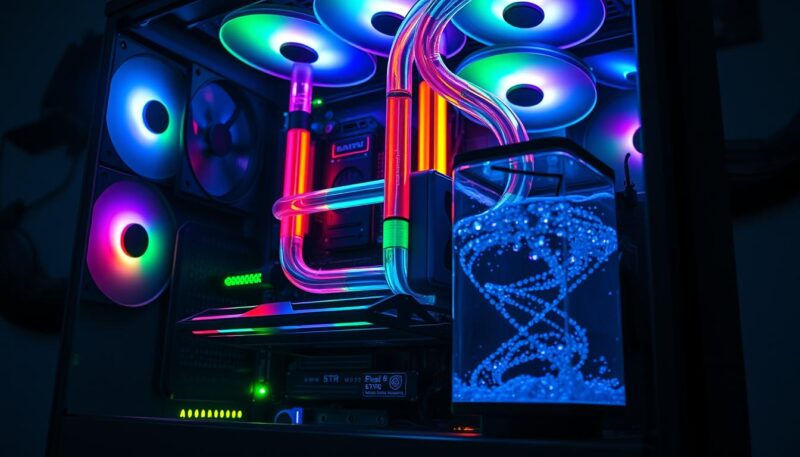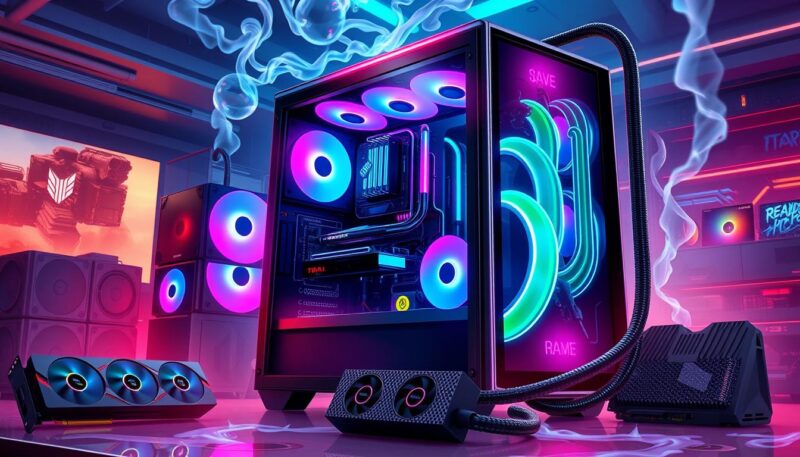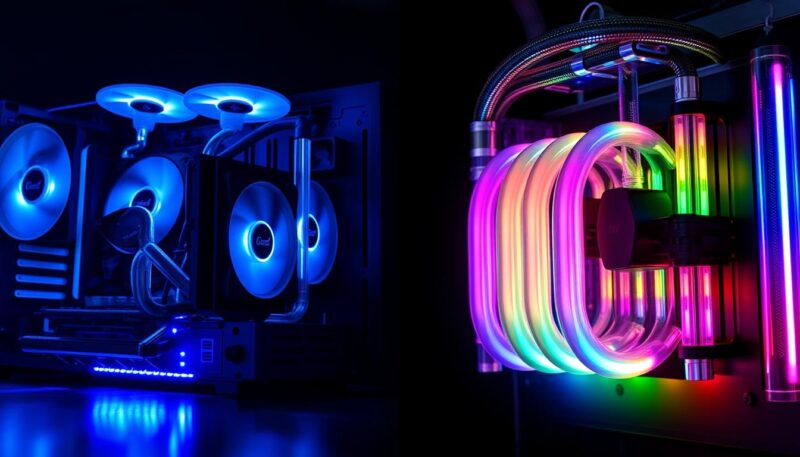When it comes to optimizing your gaming PC, one of the most crucial yet often overlooked aspects is its cooling system. Choosing the best cooling solutions for your gaming PC can mean the difference between consistent high performance and frustrating overheating issues. You may have heard the ongoing debate surrounding air vs. liquid cooling—in this article, we’ll dive deep into these two dominant technologies to help you decide which solution aligns with your gaming needs and aspirations.
Cooling is not just an accessory but a necessity for any gaming hardware, especially when you’re pushing your system to its limits during intense gaming sessions. Both air cooling and liquid cooling have unique benefits and constraints, such as performance, functionality, aesthetics, and budget considerations. Interestingly, liquid cooling can be 2-10 times more effective than traditional air cooling, making it a premier choice for those who prioritize optimal performance. However, these superior cooling capacities come at a cost: liquid systems typically require more maintenance and commitment compared to air systems.
In our exploration below, we will help you understand the intricate workings of both cooling systems, why they matter for PC thermal solutions, and how to make an informed choice that suits your gaming lifestyle. Whether you’re a seasoned enthusiast improving your rig or a beginner embarking on your PC-building journey, the selection of cooling systems is a topic that deserves your attention. Let’s embark on this exciting journey into the world of gaming PC cooling!
Understanding Air Cooling Systems
Air cooling systems are a fundamental choice for managing heat in your gaming PC. Their design is straightforward, relying on a heat sink and fan to dissipate heat generated by critical components such as the CPU. For many PC builders, understanding how these systems function enhances their ability to optimize gaming PC performance.
How Air Cooling Works
The operation of air cooling systems involves a heat sink that absorbs heat and a fan that pushes air over the sink to carry away the heat. This process creates a steady airflow that reduces the temperature of essential parts. Given its simplicity, it is often the go-to solution for gamers looking to assemble their rigs efficiently.
Advantages of Air Cooling
Among the various air cooling advantages, affordability stands out. Air cooling systems usually come with a lower price tag compared to liquid cooling solutions, making them ideal for budget-conscious builders. Additional benefits include ease of installation and minimal maintenance, freeing up time and effort for you to focus on other PC building tips. The straightforward nature of air cooling can make it appealing to both novice and experienced builders alike.
Drawbacks of Air Cooling
While there are many strengths, some drawbacks of air cooling should be considered. Noise levels can be higher when under load, which may affect your gaming experience. Air cooling may also struggle to perform under extreme conditions, potentially limiting your system’s overclocking capabilities. For enthusiasts seeking a visually striking aesthetic or superior performance, air cooling may not meet all your criteria.
| Feature | Air Cooling Systems | Liquid Cooling Systems |
|---|---|---|
| Cost | Lower initial investment | Higher initial investment |
| Maintenance | Low maintenance, dust accumulation is key | More frequent maintenance, topping up coolant |
| Performance | Sufficient for many setups, less efficient in extreme cooling | Superior dissipation for high-performance and overclocked systems |
| Noise Levels | More noticeable under load | Generally quieter operation |
| Aesthetics | Less visually appealing | More striking and customizable |
Exploring Liquid Cooling Solutions
Liquid cooling systems represent a sophisticated approach to managing heat in gaming PCs. Unlike traditional air cooling methods, which rely on fans and airflow, liquid cooling utilizes a coolant to absorb and dissipate heat more effectively, ensuring optimal performance for your components. This method is particularly advantageous for CPU cooling and GPU cooling, especially when gaming demands peak performance.
What is Liquid Cooling?
Liquid cooling involves a closed-loop system that circulates coolant through water blocks mounted on your CPU and GPU. This coolant absorbs heat and transports it to a radiator, where it dissipates the heat into the air. Components such as a pump, tubing, and reservoir complete the setup. While many prefer air cooling solutions for their simplicity, liquid cooling solutions offer better temperature management, especially under heavy workloads.
Benefits of Liquid Cooling
- Superior cooling performance compared to air cooling solutions.
- Quieter operation, creating an immersive gaming experience.
- Enhanced overclocking potential for increased clock speeds and stability.
- More visually appealing designs, often featuring RGB lighting.
- Customization options with bespoke setups that cater to unique aesthetics.
Potential Downsides of Liquid Cooling
While the liquid cooling benefits are attractive, some downsides exist. The installation process is more complex than air cooling solutions, requiring careful setup of components like the water block, radiator, and tubing. Regular maintenance is necessary, including topping off the coolant and flushing the system occasionally. Additionally, liquid cooling systems tend to be more expensive due to the advanced components involved. For those not pushing their gaming PCs to the limit, air cooling may still be a viable option.

| Aspect | Liquid Cooling | Air Cooling |
|---|---|---|
| Cooling Performance | Excellent | Good |
| Noise Level | Low | Higher |
| Installation Complexity | More Complex | Simple |
| Maintenance | Regular | Minimal |
| Cost | Higher | Lower |
Best Cooling Solutions for Your Gaming PC
When deciding on the best cooling solutions for your gaming PC, several factors will influence your choice between air cooling vs liquid cooling. Your gaming habits, budget, and desired performance level play critical roles in this decision-making process. Evaluating your specific requirements can lead you to the most effective cooling solutions while keeping your system’s temperature in check during those intense gaming sessions.
Choosing Based on Your Needs
Assessing your needs involves understanding the nature of your gaming PC build. Are you a casual gamer, or do you engage in heavy overclocking? If your system is likely to push high performance, investing in liquid cooling may provide superior temperature regulation compared to traditional air coolers. Conversely, if you’re on a tight budget, air cooling offers excellent overheating solutions, with many options like the Thermalright Assassin X 120 R SE available for under $20.
- Air cooling solutions are generally less expensive, with high-end options capping at around $100.
- Liquid cooling systems, while more costly, often integrate features that enhance performance and aesthetics, such as the Cooler Master Master Liquid 360 Atmos priced under $150.
- Consider case size and airflow when choosing the best cooling solutions for gaming PC, as cramped spaces can affect cooling efficiency.
Considerations for Overclocking and Performance
Overclocking can significantly generate heat, affecting CPUs and GPUs. Liquid cooling systems are particularly favorable in these scenarios due to their ability to maintain consistent temperatures, minimizing throttling during demanding tasks. The Silverstone IceMyst 360 stands out by providing stackable fans for RAM and VRMs, leading to enhanced overall cooling performance. The choice between air cooling and liquid cooling should reflect your commitment to gaming and the performance level you expect from your PC.

Conclusion
Both air cooling and liquid cooling solutions present unique benefits and limitations, making the choice of the best cooling solutions for your gaming PC a matter of personal preference and specific requirements. If simplicity and cost-effectiveness are priorities for you, air cooling could be the optimal route to take. However, for those who pursue superior cooling efficiency and quieter operation, especially during demanding gaming sessions, liquid cooling shines in comparison.
Consider your budget, technical skills, and performance needs as you evaluate air cooling vs liquid cooling options. While air cooling systems are generally easier to maintain, they might not compete with the exceptional heat dissipation capabilities offered by liquid cooling, particularly for high-performance setups. Moreover, the aesthetic appeal of a well-designed liquid cooling system with features like RGB lighting can elevate your overall gaming experience.
Ultimately, making an informed decision ensures that your gaming hardware operates efficiently and extends longevity. By effectively managing heat—whether through air or liquid cooling—you can safeguard your components from thermal damage and enhance your overall optimal gaming setup. Your choice directly influences not only performance but also the visual and auditory enjoyment of your gaming environment.

